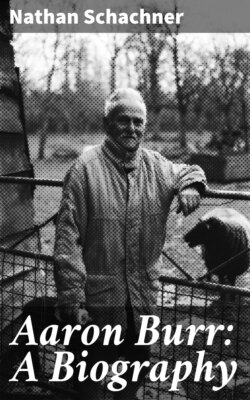Читать книгу Aaron Burr: A Biography - Nathan Schachner - Страница 4
На сайте Литреса книга снята с продажи.
1. Respectable Burrs
ОглавлениеTable of Contents
“I have never known, in any country,” declared John Adams, second President of the United States, “the prejudice in favor of birth, parentage and descent more conspicuous than in the instance of Colonel Burr.”[1]
The phraseology of the testy old man, reminiscing publicly in the year 1815, was singularly inept, for neither his own context nor the facts themselves disclose that Aaron Burr’s meteoric rise, nor, for that matter, his as precipitous fall, was in anywise influenced by a general public preoccupation with the incidence of “birth, parentage and descent.”
Nevertheless the major premise remains intact. It would be difficult, in that early period of American history, to discover another whose lineage, on either branch of the convergent family tree, was as proudly intellectual, as earnestly God-fearing, as solid and substantial in the things of the world, as that of Aaron Burr.
The first paternal Burr of whom there is any authentic public record was a certain Jehue, who migrated with Winthrop’s fleet in 1630 to the bleak and uninviting shores of Massachusetts for the greater glory of God and the possible enhancement of his own economic status.
There is no reason to doubt that he found satisfaction on both counts, for he very early occupied a solid niche in the affairs of that theocratic Colony. In Roxbury, where he first settled, he was appointed Overseer of Roads and Bridges; when, seized with restlessness and lured by the reports of broad, fertile acres, he pushed on to Agawam, in the newly established Colony of Connecticut, he was soon its Tax Collector, probably the first. When he finally removed to Fairfield, in the same Colony, he was chosen Town Commissioner and representative in the General Court. In short, by the time he died in 1672 he had placed the name of Burr on a very respectable basis indeed.
Nor did his descendants let him down. They increased and multiplied in accordance with the Biblical injunction, and they steadily and uninterruptedly added new laurels to the family escutcheon. Their roots went deep into the Town of Fairfield; their influence spread over the Colony. They became deputies and members of the Council, lawyers and magistrates. Their activities ranged from officiating at witch trials to service in the House of Deputies. They became wealthy landowners and they went to war. They were captains, and majors and colonels, and, from all accounts, acquitted themselves most creditably.
Jehu Burr, Junior, for instance, one of four sons sired by Jehue the Elder, followed in his father’s footsteps, representing Fairfield in the Court of Deputies and then in the Standing Council. He was one of the first in the youthful Colonies to advocate actively the adoption of a public-school system supported by state funds. This notable heresy of his, however, met with defeat at the hands of his sterner associates. He died in 1692, leaving ten children.
Major John Burr, his brother, achieved his warlike title in the ever-enduring Indian Wars. He, too, was a deputy, a senator, and later a magistrate. It was his proud distinction to be one of the judges at the trial of Mercy Desborough in 1692 for practices that smacked strongly of witchcraft. He voted equally with his fellows for the death sentence.
Then there was Judge Peter Burr, son of Jehu, Jr., who was graduated from that early cradle of the arts and theology, Harvard, and went into the law. He held at one time or another most of the offices within the gift of Connecticut, and ended as Chief Judge of the Superior Court. He died in 1724, perhaps the most eminent of the early Burrs.
There were others, too. Colonel John Burr, grandson of Jehue, Sr., who found time from his political and judicial activities to behave very gallantly in the New England expedition against Port Royal. Nor did they prevent him from becoming one of the largest landowners in the Colony. His estate at the time of his death in 1750 was valued at 15,288 pounds, an immense sum in those days.
Colonel Andrew Burr, grandson of Major John, followed the regular pattern. Law, magistrate, Speaker of the House, and a distinguished soldier who participated in the capture of that formidable fortress, Louisburg. His death occurred in 1763.
Nor were these all. Others of the Burrs, not mentioned, had claim to a certain prominence and the seated respect of their fellows. There were ministers of the Word of God among them, as was natural in pious New England, and they married well, all of them, forming a close-knit web with the first families of the Colonies, so that the strain was deepened and enriched.
Aaron Burr’s grandfather on the paternal side, Daniel Burr, strangely enough, had little to commend him as far as positive achievements were concerned. It was true that he was comfortably wealthy and the owner of broad, well-tended lands in Fairfield, but these were inherited matters. He was a good, honest gentleman who minded his own affairs and tended his acres without too much ado in the world at large. But in one particular he was notable. He begot Aaron, who in due time was to become the Reverend Aaron Burr, the second President of Princeton College, and who in turn fathered Aaron Burr, the subject of this biography.[2]
